- Home
- Michael Dobbs
A Ghost at the Door Page 2
A Ghost at the Door Read online
Page 2
He was bright. Won a scholarship. Got to Oxford, made his mark, then got married, and, by the time Harry came along, they lived in some style in one of those tree-lined avenues of Holland Park, not the best avenue but still pretty damned in-your-face. Harry remembered an eddying autumn day when he was seven, answering a knock on the door. Standing in the rain on the York-stone doorstep he found a nervous woman with pale face and red rims to her eyes begging to talk with his father. A little later, from behind his bedroom door, Harry heard them arguing. She was the widow of his father’s business partner, recently buried, and now she wanted her share, for the children. Johnnie explained that he had a family of his own, that their business was in cash, no records, no formal partnership agreement. Anyway, he had added, her husband had spent months dying and had contributed nothing. At that point Harry had quietly locked his bedroom door and buried his head in a book. He knew how the conversation would end. It was a lesson he was to see repeated more than once during the next few years.
And yet . . . And yet, despite it all, despite the unreliability, the rows with his mother and the times he simply disappeared from their lives, his father had offered moments that Harry had cherished. Like the Christmas Day when Harry had woken to find the streets covered in snow. He’d been so excited until he found his mother in tears. The Aga had broken down, the fire gone out, their day destroyed. Harry remembered her being almost fearful of his father’s reaction, yet Johnnie hadn’t even raised his voice. He’d hauled an old wooden sledge from the attic, placed Harry on top wrapped in his overcoat and favourite football scarf, and they had walked through the park to the Dorchester Hotel for their dinner, his father pulling Harry all the while. The snow had fallen around them every step of the way, laying down memories that would last a lifetime but that would never quite manage to swallow up the darker moments.
Harry had never been able to get to grips with how his father earned his living – the term ‘financial adviser’ covered so much ground. The family had covered a fair amount of ground, too, spent their holidays in Val d’Isère, Cannes, Antigua and Australia, and Harry’s life had lacked for nothing in a material sense. His father had taught him to drive in the South of France in a green, three-litre, 1924 Bentley with a leather strap across its bonnet and a wicker hamper in the boot. He’d been barely sixteen when he’d first sat behind that wheel, another sparkling father–son moment that, as so often, Johnnie had soon contrived to ruin. It was on that same trip that Harry had slept with his first woman – something else his father had arranged. Yet, for Harry, in hindsight, it was too much. Surely that moment of all moments should have been a private matter, not something for his father’s holiday album or banter in the yacht club. Anyway, Harry suspected that his father had screwed the girl, too, but it was the 1980s and the word ‘excess’ seemed to have been banned from the language.
Other women had always been a feature of his father’s world. After his mother had died, alone in her large bed in her empty house in Holland Park, one woman in particular had, for a while, become a part of Johnnie’s life. Harry thought for a while she had driven them apart. It was about the time that Harry had applied for a place at Cambridge – he had no intention of following in his father’s footsteps to the other place, Oxford, as Johnnie had tried to insist upon. The son could be stubborn, too. So, when the crested letter of acceptance had arrived, his father stared at him across the kitchen and said Harry was now on his own, that the fountain of money would be switched off, that he had to learn to stand on his own feet – ‘just as I did’. A barrier was built between them. At first Harry blamed the new woman, but she eventually disappeared, was replaced, but nothing changed. His father still spent vacations in exotic places but no longer with his son. Harry paid his way through college by working nights at McDonald’s and weekends at a call centre. Communication with his father diminished. In his final year at Cambridge, Harry waited for his father to call him. He waited six months. Then he deleted Johnnie’s number from his contact list.
‘Tell me about your father,’ Jemma had said. Harry didn’t even want to tell himself, yet she stirred something inside him that for several days had distracted him, made him seem distant. He was soaking in his bath, remembering too much, when Jemma walked in. She hadn’t a stitch of clothing on her. He appeared not to notice.
‘Seems I need to pay a hell of a lot more than a penny for them,’ she laughed – she always laughed so easily.
‘What?’ he said, raising his eyes in confusion.
‘Your thoughts.’
He went back to staring at his water-wrinkled toes. ‘Sorry, Jem. But you got me thinking about my father.’
‘I’d like you to tell me more.’
‘I don’t even know where to start.’
She wrapped a towel around herself and perched on the end of the bath. ‘OK, let’s start at the end and work backwards. When did he die?’
‘Oh, back in 2001. Early summer,’ he replied reluctantly.
‘I’m sorry.’
‘I’m not. Left me a fortune.’ The comment was uncharacteristically callous. His father seemed to bring out a dark side in him, yet in Harry’s eyes Jemma could see a rare sheen of vulnerability.
‘Where did he die?’
‘On a yacht. Off Missolonghi in Greece. It was where Byron died.’
‘Poetic.’
‘Not really.’
‘I don’t understand.’
‘You wouldn’t believe me if I told you.’
‘I do sometimes.’
Hell, she was persistent but she had a right to know. He sighed. ‘My father was sixty and screwing one of his women. In her twenties, apparently. Didn’t pace himself, never could. Heart attack.’
‘You Joneses, you always rush things. Still, he died in bed.’
‘On the sun deck, I’m told.’
‘I really am sorry, Harry.’
‘No need. He and I, we . . .’ He seemed about to add something, but trailed off. ‘It doesn’t matter any more.’
It didn’t matter? He had lied to her before, of course, as all couples do, but nothing more than modest white lies, usually to protect her. This was the first time he had lied to protect himself.
‘Where’s he buried?’ she encouraged softly.
‘In Greece.’
‘Not here?’
‘It all got a little complicated. You see, the boat was owned by a Russian and registered in Panama. Flag of convenience, fewer rules, lower taxes, that sort of thing. And it was sailing off the Corinth Canal in international waters. So when it happened no one wanted the responsibility, not the Greeks, the Panamanians, certainly not the British consul in Patras, and least of all a man from Moscow who was on the make. Even when he was dead my father proved he could be a very accomplished pain in the arse.’
‘But what about you? You were next of kin.’
‘Didn’t hear about it for a while. No one could find me. It was the time when I was finishing off my days in the Army, in West Africa and very officially out of contact, doing a little job that even our own Prime Minister wasn’t supposed to know about.’
There had been quite a few of those, during his military career. He’d told Jemma about them, even though she wasn’t supposed to know, either; he’d had to find some way of explaining the collection of scars that decorated his body. Anyway, there were little things like a Military Cross and Distinguished Service Medal that rather gave the game away.
‘No one wanted an unclaimed body hanging around,’ he said, hoping to finish with the story, ‘so someone decided to deal with it.’
‘But who?’
‘I’ve no idea. And frankly I didn’t particularly care. What the hell does it matter, anyway? My father didn’t deserve a state funeral.’ This was said in a tone that betrayed his discomfort. Harry hauled himself up from the cooling bathwater, suds meandering in sluggish streams down his body. He’d had enough of this conversation, but Jemma wasn’t so easily put aside.
‘You s
hould care what happened to your father,’ she said, gently but insistent.
‘For God’s sake, why?’
To bring closure, to cut the emotional dependency, to set old ghosts to rest, all those things that counsellors urged on the bereaved, but Jemma knew that a little cod psychotherapy would never be enough with Harry. So she stared at him, not letting him escape. ‘Because, Harry,’ she whispered in a way that seemed to ring an entire peal of bells, ‘our children will want to know.’
A manila documents folder. Neglected, blue, scruffy, its corners battered, its second-hand status betrayed by the felt-tipped scrawling across its cover that declared it had once been used for Harry’s old tax papers. That was it, all he had left to record the death of his father, and it wasn’t even half full. A passport, its corner clipped. A copy of a death certificate, in Greek. A brief and tautly formal note from the Foreign & Commonwealth Office expressing regret, alongside a handful of notes of condolence, mostly from people Harry had never met. His father always had peculiar friends – no, not friends, wrong word, but colleagues, associates in business, whatever damned business that was. Not true friends.
And a single photograph, of Harry when he was perhaps thirteen, smiling coyly, in swimming trunks, with his father’s arm around his shoulders. They were on a beach of a distant shore, the photo probably taken by some unsuitable female friend of his father’s, though Harry couldn’t remember for sure. It was wrapped in a single folded sheet of notepaper from his father’s lawyer and executor, Robert Tallon, a senior partner in an exclusive London legal firm. The letter was dated August 2001. It summarized previous correspondence and recorded the fact that, due to the complexity of his father’s estate, it would take considerable time and in all probability several years before matters regarding the estate could be finalized and that, in the meantime, he was transferring the sum of £8,376,482.04 to Harry’s account as an initial instalment. Tallon was a punctilious ferret of a man, right down to the last four pence.
It was in the riverside offices of the same Robert Tallon that Harry and Jemma were now sitting, the file and its contents spilling uncomfortably onto the glass-topped conference table. Tallon, elderly, experienced, probably close to retirement, sat peering down a red and slightly damp nose on which were perched his rimless glasses. His hands were clasped in front of him, his silk tie spilling above the waistcoat of his tailored chalk-stripe suit, his overcombed hair was greying, his complexion pale, but the eyes were sharp.
‘Mr Jones,’ the lawyer began – even after all these years and so many millions, he still clung to the formalities – ‘you ask about your father.’ There was a hint of Edinburgh in the slow vowels. ‘I’m afraid there’s not much I can give you. I met him only rarely – he spent so little time in this country in his last years. Your father always told me, with some pride, I should add, that he was a citizen of the world.’
‘No wonder he was never home,’ Harry muttered.
The lawyer dabbed at his nose with a handkerchief he kept tucked up the sleeve of his suit. ‘He was cautious about his affairs. Which were, as you know, complicated.’
Harry’s fingers brushed across the manila folder. ‘This is all I have. A ridiculously simple file for such a complicated man, isn’t it?’ Jemma thought she noticed an edge of both regret and self-rebuke in his voice. He turned to her. ‘Seems he didn’t own a home anywhere, just postboxes in various dusty places and a financial operation so impenetrable that it’s kept Mr Tallon here busy ever since.’
‘Well, not busy, not any longer. We wait patiently. For developments.’
Outside the window the Thames wound reluctantly through the piers of Waterloo Bridge. In the distance the towers of the City stood beneath a glowering ozone sky of purples and browns like skittles waiting for the clout of the next financial onslaught.
‘Developments? I’m sorry, what developments?’ Jemma asked.
Tallon turned towards her with a suggestion of reluctance: he didn’t welcome the presence of amateurs. ‘I think we have to conclude that the senior Mr Jones’s arrangements were deliberately obscure. He lived in several countries but didn’t have title to a residence, at least not for tax purposes. He had many investments but didn’t own a single share.’
‘Oh, I see. You mean he was a tax evader.’
The lawyer arched an eyebrow in displeasure. ‘Not an evader as such, but he was undoubtedly efficient. He broke no laws, otherwise I would never have acted for him.’
Jemma offered a smile of understanding, wondering if a diet of prunes might help the lawyer relax.
‘It seems my father buried his money so deep that taxmen would need a degree in deep-shaft mining in order to get anywhere near it,’ Harry said.
‘I’m sure your father had nothing but your best interests at heart, Mr Jones,’ the lawyer said in a tone that suggested he cared little for Harry’s description.
‘You’ll forgive me but I’m sure that was the last thing on his mind.’
‘You were the sole beneficiary,’ Tallon said, staring over the rim of his glasses in rebuke. ‘To this point his estate has been able to remit to you a total of fifteen million, three hundred and eighty-eight thousand, five hundred and twelve pounds. And eighteen pence,’ he added, peering at a neat file in front of him. ‘In time, I hope we shall disentangle more. Your father’s share in the landholding in Brazil could prove particularly beneficial once the authorities understand the rather complex nature of his investment trust and lift their embargo on its sale.’
‘It’s been more than ten years.’
‘Matters move somewhat slowly through the rainforest.’
‘Let’s hope it’s still there in another ten.’
Jemma gazed at the thin blue file with its curled edges and scrawlings on the cover. Recycled crap. It was all Harry seemed to think his father was worth, despite the millions. She began to understand how angry Harry was, and had always been.
Tallon’s lips moved slowly as he searched for the right words. ‘Mr Jones, I understand, I sympathize. I know how challenging this past year has been for you.’ He paused for some expression, some indication of what Harry felt, but got none. ‘I assure you I shall continue to do my very best to release whatever money is left in the estate.’
‘But it’s not really the money, you see, Mr Tallon,’ Jemma said. ‘That’s not why we’re here. We simply want to know more about Harry’s father. You seemed the obvious place to start.’
‘I can’t help you.’
‘How he died, what happened,’ she continued.
‘You have all I know.’
‘There must be something.’
‘You said . . .’ Harry interrupted them both. ‘When you and I first met, Mr Tallon, you spoke of a young woman. The cause of his heart attack.’
The lawyer took off his glasses and began polishing them with his handkerchief while he blinked rapidly in evident discomfort. ‘It was no more than a rumour.’
‘Whose rumour? Where did you hear it?’ Inside, Harry felt a flicker of shame that it was the first time he’d even bothered to ask. There was so much about his father he hadn’t wanted to know, at least until now.
The lawyer said nothing. He got up from his chair and moved to the window, gazing down to the dark cupola of St Paul’s. ‘I apologize, Mr Jones, I should never have mentioned the matter. Unprofessional of me. It was only to explain any reticence you might have detected in my handling of your father’s affairs. I haven’t mentioned it to another soul. I thought it right that I should try to protect not just his estate but also his reputation.’
‘So how did you come across this exquisite piece of gossip?’ Harry persisted.
Tallon turned to face him. ‘It was a phone call. I can’t remember from whom – the ship’s captain, the local consul, perhaps. It was a long time ago.’
‘You made no note?’
‘It’s not my habit to record gossip.’
‘Just to pass it on.’ The accusation sat between them befo
re Harry apologized. ‘Sorry.’
‘My fault entirely. As I said, with hindsight it was unprofessional. But I saw no point in pursuing the matter: sometimes it doesn’t pay to stir up the mud at the bottom of the pond. In any event, it made no material difference to your father’s estate.’ From the pocket of his waistcoat he pulled an ancient gold-cased watch that hung from a fob chain. He had already given them an hour. ‘Forgive me, is there any other way I can be of assistance?’
Harry stared out through the window at the sulking sky. It had been a waste of time. ‘No, thank you. Just send me your bill.’
‘I wouldn’t dream of doing such a thing. Not for the son of Johnnie Maltravers-Jones.’ He stood up and extended a hand. For the first time the lawyer’s smile seemed comfortable. ‘I shall continue to do everything I can for you, as always.’
‘I hope you’ll forgive my testiness, Mr Tallon,’ Harry said. ‘My father and I never had a comfortable relationship. It doesn’t seem to get any easier, even though he’s dead.’
‘I understand, of course I do. I only wish there was more I could do to help.’
The lawyer sat quietly once his visitors had left, staring after them. Then he grew agitated, rose and returned to his spot at the window, moving stiffly, his limbs suddenly feeling their age. He stood there for many minutes, gazing out but not seeing, struggling with his thoughts. It took those thoughts some time to batter him into submission, but when they had done so he turned and reached for the phone on his desk, only to recoil, cursing. ‘No, you fool!’ he snapped at himself. Every call made from that phone was recorded, its trace left on some log. So he reached for his personal mobile, buried in an inner pocket of his suit. Then he made his call.
CHAPTER TWO
It was always said of him that Harry Jones was single-minded, far more than most; at times it made him appear almost obsessive. It was both a strength and character flaw, inspiration and potential entanglement. Ruthless, some said, and not unfairly, while others saw it as arrogance and disrespect, to a degree that it had cost him the Sword of Honour at Sandhurst and always managed to get the nostrils of commanding officers twitching in dismay. Yet that same trait made him a scarily effective soldier, which was why they’d given Harry so many of the dirty jobs: Iraq, Colombia, Armagh of course, and that one in West Africa. ‘His exceptional leadership in extracting his patrol and its casualties from the chaos behind the Iraqi lines merits a high gallantry decoration,’ trilled one report after he’d dragged back the body of one of his buddies across desert and through several nights, ‘but his intemperate criticism of the personalities involved in the operation makes it unlikely that Capt. Jones will be asked to return to Special Forces.’ There were plenty more appraisals along those lines. They did, however, ask him back because Harry was the sort of bloody-minded bastard even they couldn’t ignore.

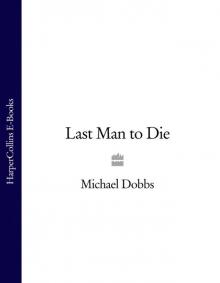 Last Man to Die
Last Man to Die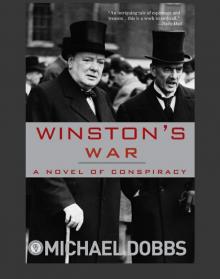 Winston's War
Winston's War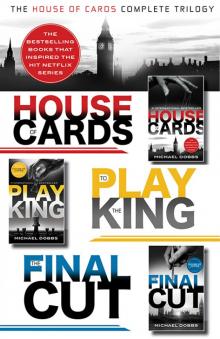 The House of Cards Complete Trilogy
The House of Cards Complete Trilogy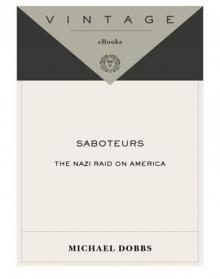 Saboteurs
Saboteurs The Touch of Innocents
The Touch of Innocents WC02 - Never Surrender
WC02 - Never Surrender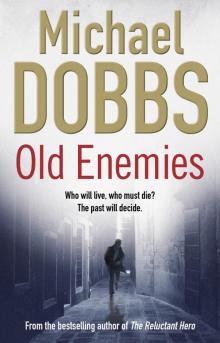 Old Enemies
Old Enemies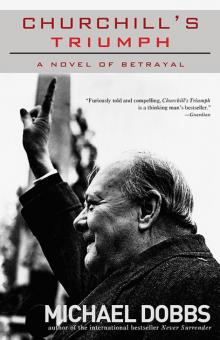 Churchill's Triumph
Churchill's Triumph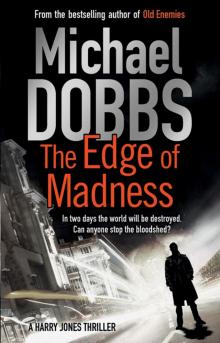 The Edge of Madness
The Edge of Madness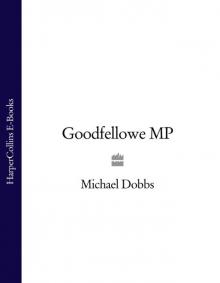 Goodfellowe MP
Goodfellowe MP The Final Cut
The Final Cut Whispers of Betrayal
Whispers of Betrayal Churchill's Hour
Churchill's Hour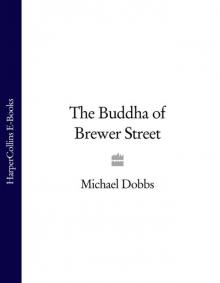 The Buddha of Brewer Street
The Buddha of Brewer Street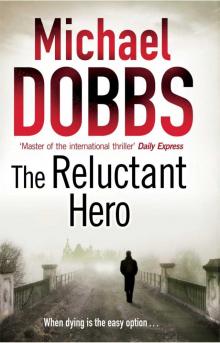 The Reluctant Hero
The Reluctant Hero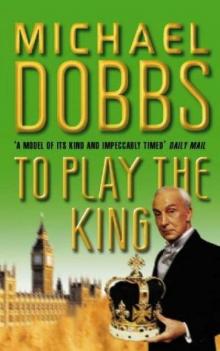 To Play the King
To Play the King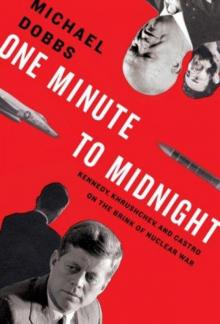 One minute to midnight
One minute to midnight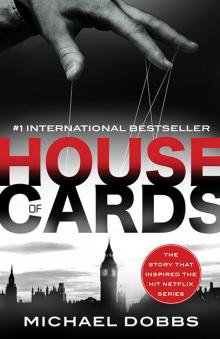 House of Cards
House of Cards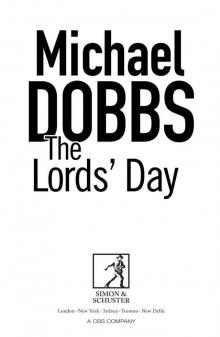 The Lords' Day (retail)
The Lords' Day (retail)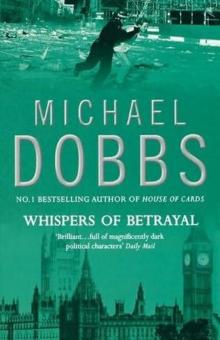 Whispers of betrayal tg-3
Whispers of betrayal tg-3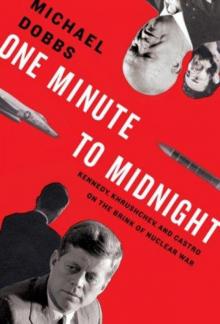 One minute to midnight: Kennedy, Khrushchev, and Castro on the brink of nuclear war
One minute to midnight: Kennedy, Khrushchev, and Castro on the brink of nuclear war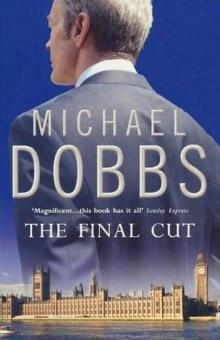 The Final Cut fu-3
The Final Cut fu-3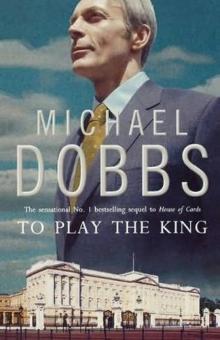 To play the king fu-2
To play the king fu-2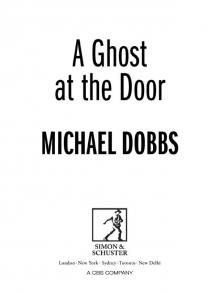 A Ghost at the Door
A Ghost at the Door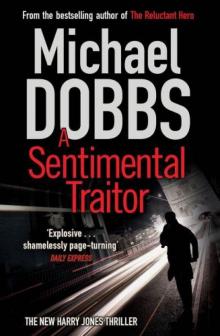 A Sentimental Traitor
A Sentimental Traitor